外研社小学四年级英语下册知识点
小学英语四年级下册课本知识点(外研版三年级起点)
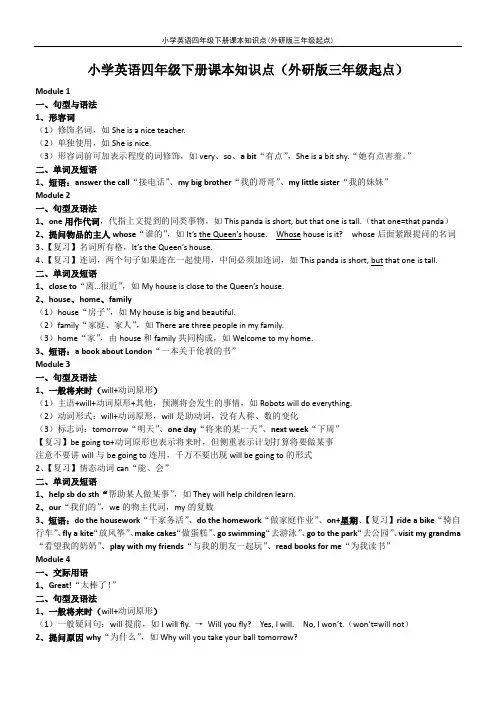
小学英语四年级下册课本知识点(外研版三年级起点)Module 1一、句型与语法1、形容词(1)修饰名词,如She is a nice teacher.(2)单独使用,如She is nice.(3)形容词前可加表示程度的词修饰,如very、so、a bit“有点”,She is a bit shy.“她有点害羞。
”二、单词及短语1、短语:answer the call“接电话”、my big brother“我的哥哥”、my little sister“我的妹妹”Module 2一、句型及语法1、one用作代词,代指上文提到的同类事物,如This panda is short, but that one is tall.(that one=that panda)2、提问物品的主人whose“谁的”,如It’s the Queen’s house. Whose house is it? whose后面紧跟提问的名词3、【复习】名词所有格,It’s the Queen’s house.4、【复习】连词,两个句子如果连在一起使用,中间必须加连词,如This panda is short, but that one is tall.二、单词及短语1、close to“离…很近”,如My house is close to the Queen’s house.2、house、home、family(1)house“房子”,如My house is big and beautiful.(2)family“家庭、家人”,如There are three people in my family.(3)home“家”,由house和family共同构成,如Welcome to my home.3、短语:a book about London“一本关于伦敦的书”Module 3一、句型及语法1、一般将来时(will+动词原形)(1)主语+will+动词原形+其他,预测将会发生的事情,如Robots will do everything.(2)动词形式:will+动词原形,will是助动词,没有人称、数的变化(3)标志词:tomorrow“明天”、one day“将来的某一天”、next week“下周”【复习】be going to+动词原形也表示将来时,但侧重表示计划打算将要做某事注意不要讲will与be going to连用,千万不要出现will be going to的形式2、【复习】情态动词can“能、会”二、单词及短语1、help sb do sth“帮助某人做某事”,如They will help children learn.2、our“我们的”,we的物主代词,my的复数3、短语:do the housework“干家务活”、do the homework“做家庭作业”、on+星期、【复习】ride a bike“骑自行车”、fly a kite“放风筝”、make cakes“做蛋糕”、go swimming“去游泳”、go to the park“去公园”、visit my grandma “看望我的奶奶”、play with my friends“与我的朋友一起玩”、read books for me“为我读书”Module 4一、交际用语1、Great!“太棒了!”二、句型及语法1、一般将来时(will+动词原形)(1)一般疑问句:will提前,如I will fly. →Will you fly? Yes, I will. No, I won’t.(won’t=will not)2、提问原因why“为什么”,如Why will you take your ball tomorrow?(1)回答:Because we are going to have a picnic tomorrow.(2)Why not?“为什么不呢”,Why won’t you do sth?=Why not do sth?eg:Why won’t you take your ball tomorrow? = Why not take your ball tomorrow?3、连词because“因为”、so“所以”,注意英语中because和so不能连用eg:Because we are going to have a picnic tomorrow, I will take my kite.We are going to have a picnic tomorrow, so I will take my kite.【复习】so“如此、这么”,如It is so hot today.4、询问天气What will be the weather?“天气怎么样?”,回答It will be+形容词,如It will be sunny.注意:will后要求加动词原形,am/is/are的原形是be,如It is sunny today. →It will be sunny tomorrow.三、单词及短语1、take“带着、拿着”,如take your kite“带着你的风筝”【复习】take“拍摄”,如take pictures“拍照”2、名词变形容词:sun-sunny、cloud-cloudy、wind-windy3、短语:have a picnic“去野餐”、【复习】in+地点,如in HaikouModule 5一、句型及语法1be动词)(1)主语+be动词过去式+其他,表示过去的情况,如I was two then.“我那时两岁”←I am ten now.“我现在十岁。
外研版小学四年级英语下学期知识点总结
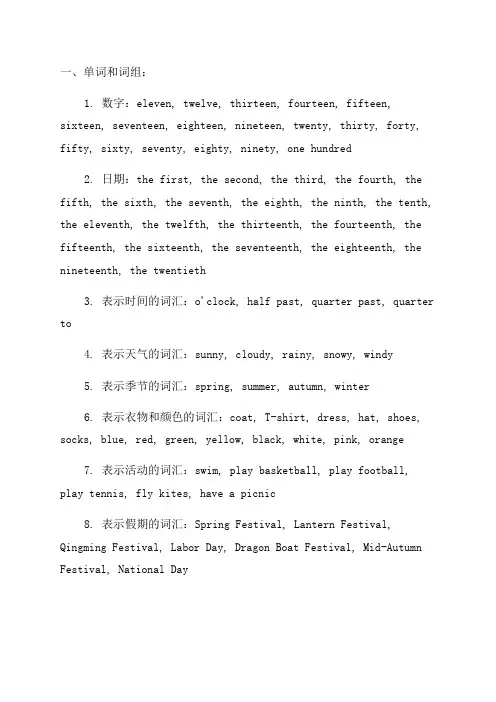
一、单词和词组:1. 数字:eleven, twelve, thirteen, fourteen, fifteen, sixteen, seventeen, eighteen, nineteen, twenty, thirty, forty, fifty, sixty, seventy, eighty, ninety, one hundred2. 日期:the first, the second, the third, the fourth, the fifth, the sixth, the seventh, the eighth, the ninth, the tenth, the eleventh, the twelfth, the thirteenth, the fourteenth, the fifteenth, the sixteenth, the seventeenth, the eighteenth, the nineteenth, the twentieth3. 表示时间的词汇:o'clock, half past, quarter past, quarter to4. 表示天气的词汇:sunny, cloudy, rainy, snowy, windy5. 表示季节的词汇:spring, summer, autumn, winter6. 表示衣物和颜色的词汇:coat, T-shirt, dress, hat, shoes, socks, blue, red, green, yellow, black, white, pink, orange7. 表示活动的词汇:swim, play basketball, play football, play tennis, fly kites, have a picnic8. 表示假期的词汇:Spring Festival, Lantern Festival, Qingming Festival, Labor Day, Dragon Boat Festival, Mid-Autumn Festival, National Day9. 形容词:big, small, tall, short, long, short, thin, fat, heavy, light, strong, weak, fast, slow, happy, sad, angry, hungry, thirsty, excited, scared, tired10. 情态动词:can, can't, could, couldn't, may, may not,will, won't, shall, shall not, must, must not二、基本句型和语法:1. 一般疑问句:Is it...? Are you...? Do you like...? Does he have...?2. 肯定回答:Yes, it is. Yes, I am. Yes, I do. Yes, he does.3. 否定回答:No, it isn't. No, I'm not. No, I don't. No, he doesn't.4.一般现在时的肯定句:主语+动词原形+其他5. 一般现在时的否定句:主语 + 动词原形 + not + 其他6. 一般现在时的一般疑问句:Do/Does + 主语 + 动词原形 + 其他?7. 一般现在时的特殊疑问句:Wh- + do/does + 主语 + 动词原形 + 其他?8. there is/there are 句型:There is + 单数名词 + 其他;There are + 复数名词 + 其他9. can/can't 句型:主语 + can/can't + 动词原形 + 其他10. could/couldn't 句型:主语 + could/couldn't + 动词原形 +其他11. can/could 提示:Can you...? Could you...? Yes, I can. Yes, I could.12. may/may not 句型:主语 + may/may not + 动词原形 + 其他13. will/won't 句型:主语 + will/won't + 动词原形 + 其他14. shall/shall not 句型:主语 + shall/shall not + 动词原形+ 其他15. must/must not 句型:主语 + must/must not + 动词原形 + 其他三、课文内容:1. Unit 1: How Do You Go There?(交通工具的使用方式)2. Unit 2: How Was Your Day Yesterday?(过去一天的活动)3. Unit 3: What's Your Hobby?(运动和爱好)4. Unit 4: What's the Day Today?(日期和天气)5. Unit 5: What Season Do You Like?(季节和天气)6. Unit 6: What Are You Wearing?(衣物和颜色)7. Unit 7: Can You Swim?(运动技能)8. Unit 8: What Did You Do in the Holidays?(假期活动)9. Unit 9: Whose Is It?(物品所有者)10. Unit 10: What Can You Do?(能力和兴趣)四、日常对话和口语表达:1. 问候:Hello! Hi! Good morning! Good afternoon! Good evening! Nice to meet you!2. 自我介绍:My name is... I am... years old. I am from...3. 询问他人的姓名和年龄:What's your name? How old are you?4. 询问他人的住所:Where do you live?5. 询问他人的过去活动:What did you do yesterday? Did you...?6. 询问他人的兴趣爱好:What's your hobby? Do you like...?7. 询问日期和天气:What's the day today? What's the weather like today?8. 询问季节和喜好:What season do you like?9. 询问衣物的颜色和穿着:What color is it? What are you wearing?10. 询问他人的能力:Can you...?以上就是外研版小学四年级英语下学期知识点的总结。
(完整版)四年级英语外研版下册知识点总结
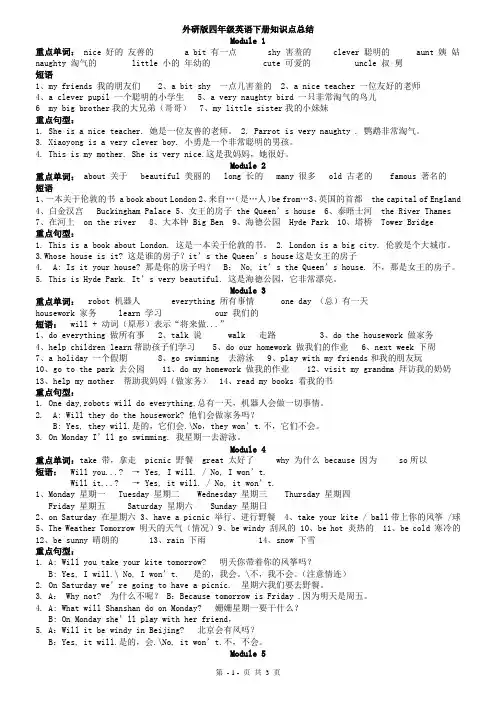
外研版四年级英语下册知识点总结Module 1重点单词: nice 好的友善的 a bit 有一点 shy 害羞的 clever 聪明的 aunt 姨姑naughty 淘气的 little 小的年幼的 cute 可爱的 uncle 叔舅短语1、my friends 我的朋友们2、a bit shy 一点儿害羞的 2、a nice teacher 一位友好的老师4、a clever pupil 一个聪明的小学生5、a very naughty bird 一只非常淘气的鸟儿6 my big brother我的大兄弟(哥哥) 7、my little sister我的小妹妹重点句型:1. She is a nice teacher. 她是一位友善的老师。
2. Parrot is very naughty . 鹦鹉非常淘气。
3. Xiaoyong is a very clever boy. 小勇是一个非常聪明的男孩。
4. This is my mother. She is very nice.这是我妈妈,她很好。
Module 2重点单词: about 关于 beautiful 美丽的 long 长的 many 很多 old 古老的 famous 著名的短语1、一本关于伦敦的书 a book about London2、来自…(是…人)be from…3、英国的首都 the capital of England4、白金汉宫 Buckingham Palace5、女王的房子 the Queen’s house6、泰晤士河 the River Thames7、在河上 on the river 8、大本钟 Big Ben 9、海德公园 Hyde Park 10、塔桥 Tower Bridge重点句型:1. This is a book about London. 这是一本关于伦敦的书。
2. London is a big city. 伦敦是个大城市。
四年级英语下册知识点总结(外研社 全册)

四年级英语下册知识点总结(外研社全册)四年级英语下册知识点总结四年级英语下册是外研社出版的一套教材,本教材囊括了四年级下学期的重要英语知识点。
本文将对这些知识点进行总结,以帮助学生加深对这些知识的理解和掌握。
一、单词学习1. 数字和时间:在四年级下册中,学生将学习如何表达数字和时间。
他们将学会用英语表达1到100的数字,以及学会问候并报时。
2. 家庭成员:学生将学习如何用英语表达家人的关系,比如爸爸、妈妈、姐姐、弟弟等。
3. 学校设施:学生将学习一些常见的学校设施的英文词汇,比如教室、图书馆、操场等。
4. 日常生活用品:学生将学会一些日常生活用品的英文名称,比如床、桌子、椅子等。
二、句型构造1. 询问与回答:学生将学会询问和回答简单的问题,比如“你叫什么名字?”“你几岁了?”等。
2. 表达喜好和能力:学生将学会用英语表示自己的喜好和能力,比如“I like swimming.”(我喜欢游泳)和“I can play the piano.”(我会弹钢琴)等。
3. 表达日常活动:学生将学会用英文表达一些日常活动,比如“我每天上学。
”(I go to school every day)和“我通常和朋友一起玩。
”(I usually play with my friends)等。
4. 情态动词的用法:学生将学习情态动词can和must的用法,例如can用于表示能力和许可,而must用于表示义务和必须。
三、语法知识1. 现在进行时:学生将学会现在进行时的构成和用法,例如“I am swimming.”(我正在游泳)和“She is eating dinner.”(她正在吃晚饭)等。
2. 一般过去时:学生将学习一般过去时的构成和用法,例如“I played soccer yesterday.”(我昨天踢足球)和“He watched a movie last night.”(他昨晚看电影)等。
3. 形容词的比较级和最高级:学生将学会形容词的比较级和最高级的构成和用法,例如“taller”(更高的)和“the tallest”(最高的)。
外研版英语四年级下册英语重要知识点
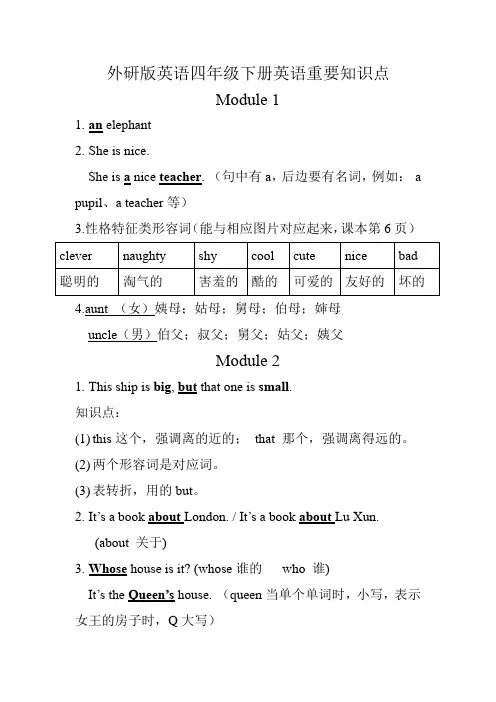
外研版英语四年级下册英语重要知识点Module 11.an elephant2.She is nice.She is a nice teacher. (句中有a,后边要有名词,例如:a pupil、a teacher等)3.性格特征类形容词(能与相应图片对应起来,课本第6页)4.aunt (女)姨母;姑母;舅母;伯母;婶母uncle(男)伯父;叔父;舅父;姑父;姨父Module 21.This ship is big, but that one is small.知识点:(1)this这个,强调离的近的;that 那个,强调离得远的。
(2)两个形容词是对应词。
(3)表转折,用的but。
2.It’s a book about London. / It’s a book about Lu Xun.(about 关于)3.Whose house is it? (whose谁的who 谁)It’s the Queen’s house. (queen当单个单词时,小写,表示女王的房子时,Q大写)4.close to接近、临近5.B uckingham P alace白金汉宫T ower B ridge 塔桥B ig B en 大本钟H yde P ark 海德公园(两个单词首字母都大写,前边没有the)6.It’s an old desk. (an 和old 有连读)7.英国地图(课本第10页,像一只抬着头的小恐龙)Module 31.can+动词原形例句:It can walk. It can talk.2. will+动词原形3. housework 家务活homework 家庭作业4. Will...? 肯定回答的答语找will 否定回答的答语找won’t5. On Tuesday, I’ll play with my friends.(具体到某一天用on,with和......一起)6.Monday 星期一Tuesday星期二Wednesday 星期三Thursday 星期四Friday星期五Saturday星期六Sunday 星期天(周二/周四、周六/周日的英语一定要区分开,已经多次考到)yesterday昨天today 今天tomorrow明天(考时态题常考)Module 41.Why not +动词原形例句:Why not take your ball?2.Why...?为什么......? Because...因为......3.It will be +描述天气的形容词+in +地点in Beijing/ShanghaiIt will rain/snow +in +地点4.描述天气的形容词能与天气符号对应起来(课本23.24页)Module 51.hair头发是不可数名词,没有复数例句: Your hair is short now. Your hair was short then.2.3.not old=young not short=tall not dirty=clean (课本30页)4. 用be动词适当形式填空,做题思路(1)主语(2)时态【表示过去的时间有then/last week/last Sunday/yesterday/two years ago以前等,可以再做一遍之前的小练习】Module 61.at home/at school/at the zoo/at the park2.接电话时用This is...介绍自己3.want to do 想要做某事in the sun在太阳底下例句:I want to play in the sun.Module 71.听力时注意有没有过去式ed的发音,区别cook/cooked、help/helped、wash/washed、play/played、watch/watched、phone/phoned、talk/talked、walk/walked 等2.talk w ith... 和......一起交谈walk with..和......一起散步3.Mrs(已婚)夫人、太太Miss小姐(注意两个单词发音)Module 81.不规则动词的过去式2.sing beautifully3. by+交通工具类例如:by train (乘火车) by plane (乘飞机)by ship (坐船)Module 91.welcome to欢迎来到某地2.live in 居住3.too 放在句末,also放在句中4.San Francisco 旧金山(金门大桥)Washington DC 华盛顿(首都)New York纽约(经济中心)5.on holiday 在度假6.Look at these photos.(these 这些,所以photos用的复数)Module 101.fall down 摔倒;坍塌fall off 跌落2.go for a +名词参加......活动3.Did +动词原形(不论did在哪里)4.4.buy +人+物给某人买某物5.go to the doctor去看医生。
外研社小学英语四年级下知识点整理
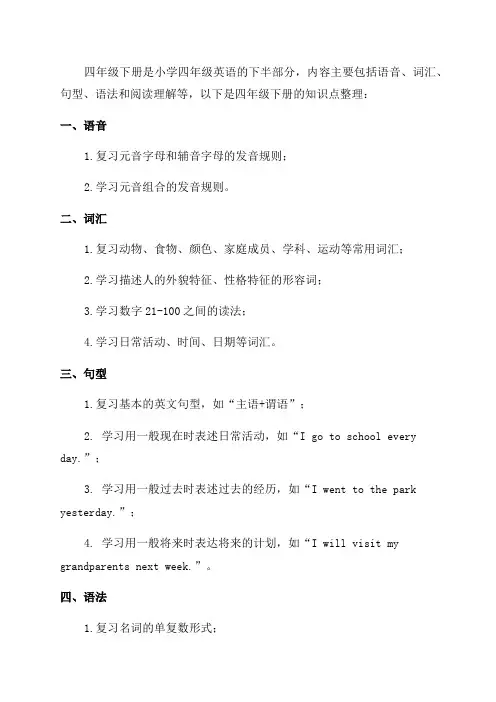
四年级下册是小学四年级英语的下半部分,内容主要包括语音、词汇、句型、语法和阅读理解等,以下是四年级下册的知识点整理:
一、语音
1.复习元音字母和辅音字母的发音规则;
2.学习元音组合的发音规则。
二、词汇
1.复习动物、食物、颜色、家庭成员、学科、运动等常用词汇;
2.学习描述人的外貌特征、性格特征的形容词;
3.学习数字21-100之间的读法;
4.学习日常活动、时间、日期等词汇。
三、句型
1.复习基本的英文句型,如“主语+谓语”;
2. 学习用一般现在时表述日常活动,如“I go to school every day.”;
3. 学习用一般过去时表述过去的经历,如“I went to the park yesterday.”;
4. 学习用一般将来时表达将来的计划,如“I will visit my grandparents next week.”。
四、语法
1.复习名词的单复数形式;
2.复习动词的时态变化;
3.学习形容词的比较级和最高级形式;
4. 学习动词的-ing形式;
5.学习副词的用法;
6.学习形容词性物主代词的用法。
五、阅读理解
1.学习通过阅读理解短文获取信息;
2.学习选择正确答案;
3.学习根据短文内容回答问题。
六、书写
1.提高字母和单词的书写规范;
2.学习正确连接字母和单词。
以上是外研社小学英语(一年级起点)四年级下册的知识点整理,希望能对学习英语有所帮助。
四年级英语外研版下册知识点总结
四年级英语外研版下册知识点总结重点单词:busy忙碌的,繁忙的happy快乐的,幸福的sad悲伤的,难过的angry生气的,愤怒的tired疲倦的,累的短语1、在学校XXX、忙碌的一天a XXX day3、高兴的孩子happy children4、难过的小狗sad puppy5、生气的老师XXX、累了tired out7、打扫房间clean the room8、吃早饭have breakfast9、上学go to school10、放学go home from school 重点句型:1.XXX.我们在学校很忙。
2.The children are happy.孩子们很开心。
3.The puppy is sad.小狗很难过。
4.XXX is angry.老师很生气。
5.I am XXX.我累坏了。
6.Let’s clean the room.让我们打扫房间。
7.It’s time to have breakfast.该吃早饭了。
8.Let’s go to school.让我们去上学。
9.School is over.放学了。
In the future。
robots will be able to do everything for us。
This means they will talk。
walk。
and even do the housework。
They will also be able to help children learn and do our homework for us。
One day。
we may even be able to rely on robots to do everything we need.Next week。
I am looking forward to having a holiday。
I plan to go swimming with my friends and play in the park。
完整版)四年级英语外研版下册知识点总结
完整版)四年级英语外研版下册知识点总结重点单词:happy快乐的sad悲伤的angry生气的tired疲倦的hungry饥饿的thirsty口渴的excited兴奋的短语1、感到快乐feel happy2、感到疲倦feel tired3、感到饥饿feel hungry4、感到口渴feel thirsty5、感到兴奋feel excited6、感到生气feel angry7、感到悲伤feel sad重点句型:1.I feel happy today.我今天感到快乐。
2.She feels tired after running.她跑步后感到疲倦。
3.He feels hungry.他感到饥饿。
4.I am thirsty.我口渴了。
5.She is excited about her birthday party.她对自己的生日派对感到兴奋。
6.He is angry with his friend.他对他的朋友生气了。
7.She is sad because she lost her toy.她因为丢失了她的玩具而感到悲伤。
One day。
robots will be able to do everything。
including talking and walking。
They will even be able to do the housework and help children learn。
Our homework will be done by robots too。
Next week。
we might even have a holiday because robots will be doing everything for us.On Saturday。
the weather will be great for a ic。
Will you take your kite or ball。
外研版四年级英语下册知识点总结完整版本
外研版四年级英语下册总结Module1--10短语Module 1 短语1、my friends 我的朋友们2、a bit 一点儿3、a nice teacher 一位友善的老师4、a clever pupil 一个聪明的小学生5、a very naughty bird 一只非常淘气的鸟儿6、my big brother我的大兄弟(哥哥)7、my little sister我的小妹妹Module 2 短语1、a book about London 一本关于伦敦的书2、be from…来自…(是…人)3、the capital of England 英国的首都4、Buckingham Palace白金汉宫5、the Queen’s house皇后(女王)的房子6、the River Thames泰晤士河7、on the river在河上8、Big Ben大本钟9、Hyde Park 哈德公园10. Tower Bridge塔桥11. London Beidge伦敦桥12 fall down倒下Module 3 短语:2、on Saturday 在星期六3、have a picnic 举行、进行野餐5、take your kite 带上你的风筝6、go swimming 去游泳7、next week 下周8、a holiday 一个假期9、play with my friends和我的朋友玩10、go to the park 去公园11、do my(one`s) homework 做我的(某人的)作业12、visit my grandma 拜访我的奶奶13、help my mother 帮助我妈妈(做家务)14、read my books 看我的书Module4 短语1、one day 有一天/总有一天2、do the housework 做家务3、help children learn帮助孩子们学习4、do our homework 做我们的作业5、make cakes 做蛋糕6、listen to music 听音乐7、in Beijing 在北京8、The Weather Tomorrow 明天的天气(情况)9、be windy 刮风的10、be hot 炎热的11、I don`t know .我不知道。
外研社(三起)四年级英语下册知识点
小学英语第四册复习资料一、单词1、时间 morning afternoon evening night1 o’clock,2 o’clock,3 o’clock,4 o’clock,5 o’clock,6 o’clock7 o’clock,8 o’clock,9 o’clock,10 o’clock,11 o’clock,12 o’clock2、地点 zoo playground beach park3、衣服 raincoat sweater shorts pants4、课目piano lessons kung fu lessons math lessons Chinese lessons5、身体部位 stomach arm leg head6、职业 singer reporter police officer doctor7、国家 Canada Australia the USA the UK8、态度(状态)kind polite funny hard—working9、做事writing a postcard reading a book talking to friends shopping10、反义词(相对)exciting—boring busy —relaxing beautiful——modern二、基本句型1、What time is it? It’s 7 o’clock.2、What time do you wake up ? I wake up at 8 o’clock.3、Do you want to go to the beach ?No, maybe not. It’s cloudy ?/ Yes! Great idea!4、What are you wearing? I’m wearing a red dress.What’s she/he wearing? She/He wearing brown shoes .5、What’s wrong? My leg hurts.6、When do you go to math lessons?—— I go to math lessons on Tuesday.When do they go to swimming lessons?——They go to swimming lessons on Wednesday.7、Who’s she? She’s a singer.Where are you going? We’re going to the USA.8、Where are you from?I’m from the UK.9、What are you doing? I’m writing a postcard.三、常用缩写形式We’re = We are四、日常用语Wake up. Take a bath.Go to school. Go to bed.Brush your teeth. Comb your hair.Get dressed. Look for your jacket.Turn your hand. Lift your arms.Bend your knees. Shake your body.Check the time. Look at the map.Ask for help. Cheer!Pack your bag. Call your friend. Visit your friend. Say goodbye.。
- 1、下载文档前请自行甄别文档内容的完整性,平台不提供额外的编辑、内容补充、找答案等附加服务。
- 2、"仅部分预览"的文档,不可在线预览部分如存在完整性等问题,可反馈申请退款(可完整预览的文档不适用该条件!)。
- 3、如文档侵犯您的权益,请联系客服反馈,我们会尽快为您处理(人工客服工作时间:9:00-18:30)。
外研社小学四年级英语下册知识点第一模块一;重点单词:nice 好的;友善的 a bit 有一点 shy 害羞的 clever 聪明的naughty 淘气的 cool 酷的 little 小的;年幼的 cute 可爱的二;重点句型:1; She is a nice teacher;她是一位友善的老师。
2; Parrot is a very naughty bird; Parrot是一只非常淘气的鸟儿。
3; Xiaoyong is a very nice boy;小勇是一个非常好的男孩。
4; This is my mother; She is very nice;这是我妈妈;她很好。
5; These are my friends;这些是我的朋友。
《注意复数形式》6; A: Are you naughty? 你淘气吗?B: Yes, I am;/No, I’m not;是的;我是。
/不;我不。
《注意情景连线》第二模块一;重点单词:capital 首都 about 关于 beautiful 美丽的 long 长的 wide 宽的many 很多 river 河流 old 古老的 famous 著名的二;重点短语:look at 看;看一看 the Buckingham Palace 白金汉宫 the Big Ben大本钟 the River Thames 泰晤士河 the Hyde Park 海德公园 the Tower Bridge 塔桥三;重点句型:1; London is the capital of England;伦敦是英国的首都。
2; This is a book about London;这是一本关于伦敦的书。
3; This is the River Thames;这是泰晤士河。
4; There are many boats on the river;河上有许多船。
5;A: What’s this? 这是什么?B: It’s a book about London;这是一本关于伦敦的书。
《情景连线》6; A: Is that your house? 那是你的房子吗?B: No, it’s the Queen’s house;不;那是女王的房子。
《情景连线》7; A:Is it tall? 它高吗?B:Yes, it is;\ No, it isn’t;是的;它是。
\不;不是。
《情景连线》第三模块一;重点单词:take 带走;拿走 picnic 野餐 great 太好了 ball 球 why 为什么because 因为 so所以 homework 家庭作业 help 帮助Monday 星期一 Tuesday星期二 Wednesday星期三 Thursday星期四Friday星期五 Saturday星期六 Sunday星期日二;重点短语:on Saturday 在周六 have a picnic 野餐 go swimming去游泳 next week 下周 play with friends 和朋友玩 go to the park 去公园 do homework 做作业 visit grandma 看望奶奶 help mother 帮助妈妈 read books 读书play football 踢足球三;重点句型:1; A: Will you take your kite tomorrow? 明天你带着你的风筝吗?B: Yes, I will;\ No, I won’t;是的;我会。
\不;我不会。
《注意情连》2;On Saturday we’re going to have a picnic;星期六我们要去野餐。
3;On Monday I’ll go swimming;星期一我要去游泳。
4; A: Why not? 为什么不呢?B:Because tomorrow is Friday;因为明天是周五。
5; A: What will Shanshan do on Monday? 姗姗星期一要干什么?B: On Monday she’ll…6; Today is Monday and tomorrow is Tuesday; (注意星期的顺序)7; Will you play football on Monday ? (星期一你踢足球吗?)第四模块一;重点单词:robot 机器人 everything 所有事情 one day 《总》有一天housework 家务 learn 学习 our 我们的 weather 天气二;重点短语:do the housework 做家务 help children learn 帮助孩子学习make cakes 做蛋糕do homework 做作业 write a letter写信take pictures 照相三;天气符号:《be》hot (be)sunny (be)windy (be) cold rain snow 炎热的晴朗的有风的寒冷的下雨下雪四;重点句型:1; One day, robots will do everything;总有一天;机器人会做一切事情。
2; A: Will they do the housework? 他们会做家务吗?B: Yes, they will;是的;它们会;\No;they won’t;不;它们不会。
3; A:Will it be windy in Beijing? 北京会有风吗?B:Yes, it will;是的;会;\No, it won’t;不;不会。
《注意情景连线》4; A: What’s that?那是什么?B: It’s a robot;是个机器人。
《情景连线》第五模块一;重点单词:was 比…… old 年长的 young 年轻的 strong 强壮的二;重点短语:stand up起立 the Changjiang River 长江 the Yellow River黄河Mount Tai 泰山 Mount Qomolangma 珠穆朗玛峰 the Great Wall 长城the Summer Palace 颐和园三;比较级:(高)tall---taller (矮)short—shorter (大)big—bigger(小)small—smaller (胖)fat—fatter (瘦)thin—thinner《老》old—older (幼)young—younger (长)long—longer(强壮)strong—stronger (宽)wide—wider (山高)high--higher四;重点句型:1;Amy is taller than Lingling;艾米比玲玲高。
2; A:Is Sam stronger than Lingling?山姆比玲玲强壮吗?B:Yes,he is;\No,he isn’t;是的;他是。
\不;他不。
《情景连线》3; Beijing is bigger than Tianjin;北京比天津大。
4; A:Is 2 shorter than 1? 2比1矮吗?B:Yes,it is;\No,it isn’t;是的;它是。
\不;它不。
《情景连线》第六模块一;重点单词:voice 声音 think 认为 better 更好的 first 第一个 agree 同意 worse 较差的quiet 安静的 bad 差的 pop music 流行音乐二;重点短语:Be quiet安静 Chinese music中国音乐 play the erhu拉二胡 play the zither 弹古筝 Pop music流行音乐 play the guitar 弹吉他 play the drums 打鼓三;比较级:good(好的)------better(更好) bad(差的)----worse(更差)四;重点句型:1; I think this girl is better than the first girl;我想这个女孩比第一个女孩唱得好。
2; This boy is better than the girls;这个男孩比女孩们唱得好。
3; Tom is worse than the girls;汤姆比女孩们唱的还差。
4; Lingling is better than Daming;玲玲比大明更好。
5; A: What music do you like?你喜欢什么音乐?B:I like pop music;我喜欢流行音乐。
(情景连线)6; A: Do you agree?你同意吗?B:Yes, I do;\No,I don’t;是的;我同意。
\不;我不同意。
《情景连线》7; A: Who is that little boy?那个小男孩是谁?B: It’s Tom;那是汤姆。
《情景连线》第七模块一;重点单词:east 东;东边 west 西;西边 south 南;南边 north 北;北边 country 国家 city城市 project 综合实践活动 also 也 call 称作 speak 说《某种语言》 right 正确的 there 那里 cousin 表《堂》兄《弟;姐;妹》二;重点短语:in the east在东边 in the west在西边 in the north在北边 in the south 在南边 inAmerica 在美国the capital of …是…的首都 in China在中三;重点句型:1; New York is in the east;纽约在东边。
2;People speak English in America;在美国人们说英语。
3;Washington DC is the capital of the USA;华盛顿是美国的首都。
4;Beijing is the capital of China;北京是中国的首都。
5; A: Where is New York? 纽约在哪里?B: It’s in the east;它在东边。
《情连》第八模块一;重点单词:who 谁 grandparent 《外》祖父《母》 then 在那时 me 我《宾格》 hair 头发 so 如此地;多么地二;重点知识点:is(过去式) was are(过去式) were was(否定形式)wasn’t were(否定形式)weren’t then 表示过去 now 表示现在本模块另外复习了: young年轻的 old年老的 long 长的 short短的fat 胖的 thin瘦的 cute 可爱的 naughty 淘气的 tall高的 short 矮的三;重点句型:1; They were young then;他们那是很年轻。
